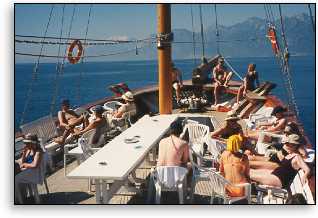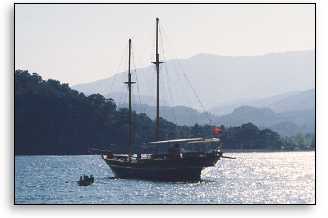Mediterranean Cruise on the
Kopton Ibrahim Ocar,
Phaeslis
Western Turkey - Group Journal
Day 9 -
Easter Sunday, 12 April 1998
by Cathy and John Barich
Happy Easter to all! We came down to breakfast to find that the Easter Bunny (a.k.a. Julie) had left chocolate Easter eggs for all of us! Thank you.
Another beautiful day, with blue skies and perfect temperature. Unfortunately those of us who headed for the harbor early were greeted by thick white clouds of diesel oil as they were apparently fumigating the foliage around the harbor. All signs were gone by the time the rest of the group congregated for our boat trip. The harbor water was blue and so clear "you can read the labels on the beer cans." (Dennis quote)

Our beautiful boat, the Kopton Ibrahim Ocar, pulled around to load us all. We were surprised that it was so big, and set up nicely with plenty of shady or sunny areas for those inclined in either direction. There was plenty of sun, as we headed out of the harbor Meli told us that if we went straight out we would get to Alexandria. Instead we headed southwest along the coast, final destination Phaselis.
We had another great lunch, served while under way, including fresh cooked fish. Quite a spread.
The boat pulled up close to give us a good view of some sea caves, then stopped near a small cave with more caves and a tiny waterfall. Several of us, led by Jim again, swam ashore to explore. Small birds with bright blue wings and white heads started out of the caves as we approached.
We pulled in one more time for swimming in a nice cove with lots of locals and other tour boars, but no ice boats!

On to Phaselis - there is no dock at the site. Apparently a boat that normally ferries people to shore was not there, so a crew member had to row small groups to shore.
According to Meli, the Phaselis area was home to several different civilizations beginning about 1100 BC. There were several small city states in the mountains around the area. Shepherds brought their flocks to graze in the area. At some point a new group (not certain from where but possibly Phoenicians) arrived by water, trading 2 boxes of fish to a shepherd for the land. This began the Lycian civilization with a "Phaselian deal."
The Lycians settled in both the mountain and coastal area. Freedom was very important to them, in fact when invaded by outsiders, on three different occasions Lycians in the capital city of Santos committed mass suicide rather than lose their freedom.
The Lycians finally agreed to become a part of the Roman empire in the period between the 2nd century BC and the 2nd century AD in return for protection from pirates who liked the excellent harbors of Phaselis. Hadrian was invited to Phaselis and entered it through a 3-arched gate. Pieces of the gate remained jumbled in piles that we were sitting on. Meli led us to a small but beautiful theatre, and we viewed and photographed other ruins including another aqueduct.
Dinner on our own - all headed in different directions.